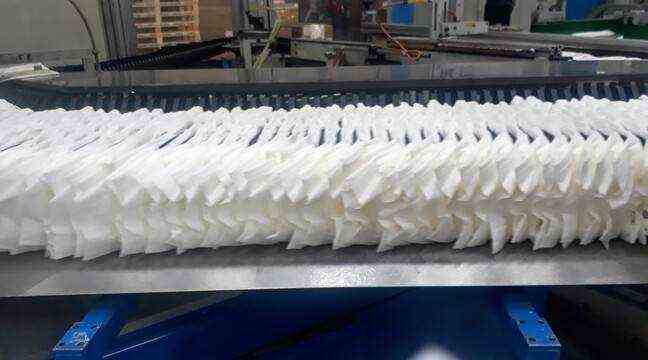Parents know that the diapers of their offspring are heavy in the trash. It is estimated that between birth and the time of potty training, a child uses about 4,500 diapers, or a ton of waste. Mixed with other household waste, the diapers end up incinerated or buried. To bring this waste back to the earth, Stéphanie and Etienne Mazet have been working since 2018 on the design and development of industrially compostable layers.
Their company Mundao, created in 2015, takes part in the Pollutec trade fair, a benchmark event for environmental solutions, which will be held between 12 and 15 October at Eurexpo Lyon.
A local network for collecting compostable layers
Traditional diapers contain ultra-absorbent beads that are very efficient but produced from petroleum derivatives. Mundao has done research & development to design its diaper, called Popotine, from bio-based materials and has developed its own super-absorbent, the composition of which it cannot reveal at this stage. The manufacturer, to whom Mundao has submitted its specifications, is installed in the Vosges and will start producing these compostable layers for experimentation in several nursery networks in the Gironde department.
“At the beginning of 2022, tests will begin for one to three months in nurseries in the city of Bordeaux, in those of Cali in Libourne and Saint-André de Cubzac,” announces Stéphanie Mazet. In Bordeaux, the Detritivores association will be responsible for collecting used diapers and the LibRT agency in Libourne. “We want to test the model and also make parents want to continue at home with a more ecological and compostable layer”, specifies the co-founder of Mundao. These diapers, for which the collection circuit remains to be invented for individuals, will be available for purchase on an online platform after the experimental phase. “There could be collective watertight intake points,” says Stéphanie Mazet.
What is industrial composting?
No way the layers end up in the middle of the vegetable peelings in the family compost. They must absolutely be subjected to industrial composting. “It is done on large volumes, on bio-waste and green waste under controlled conditions: checking the humidity, the temperature rise and we return the windrows there regularly”, specifies the co-founder of Mundao. This accelerated composting (from three to six months) ensures correct sanitation, ie the absence of pathogens. Industrial composting platforms already exist near the Bordeaux metropolitan area. Analyzes will be carried out by a certified design office throughout the composting period. As long as it is not standardized, it will be used for spreading (backfilling, green spaces.)
A compostable mask
“We had the idea before the epidemic to work on all that is personal protective equipment (masks, gowns, charlottes, overshoes, etc.), she explains. The pandemic has enabled us to speed up R & D. ”A solution to replace the nasal bar, usually made of metal, has even been developed to make a type 2 surgical mask, made in New Aquitaine, completely compostable. Its marketing will be launched on the occasion of Pollutec, which offers Mundao the opportunity to meet major accounts. It is professionals from different sectors that consume a lot of single-use sanitary textiles (industry, medicine, agrifood, etc.) who are primarily targeted. A compostable FFP2 mask is also in preparation.
Stéphanie Mazet sees good prospects for these ecological products pointing out that “the regulations will go in the direction of reducing the tonnage sent to landfill. “

